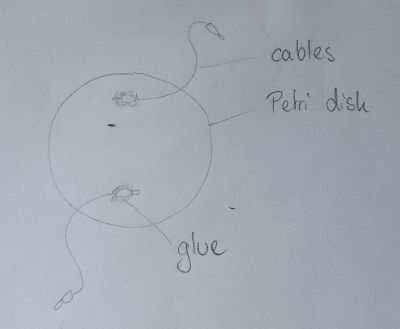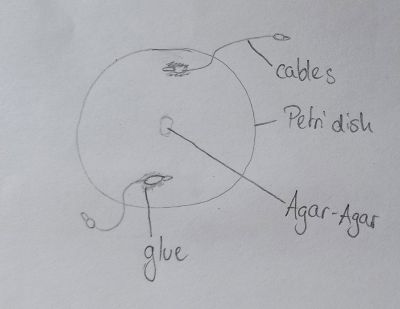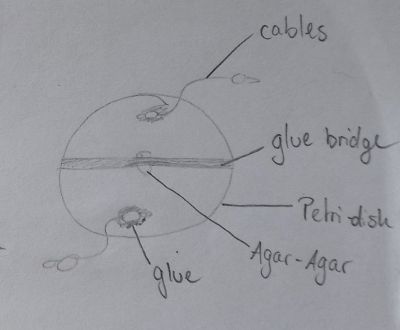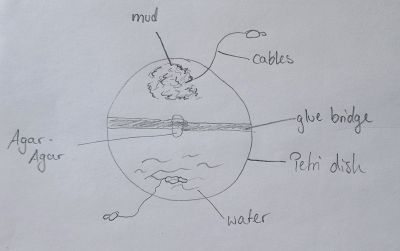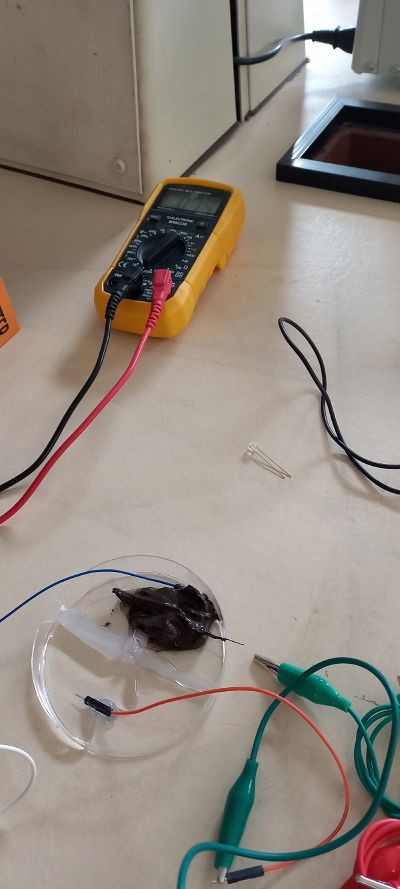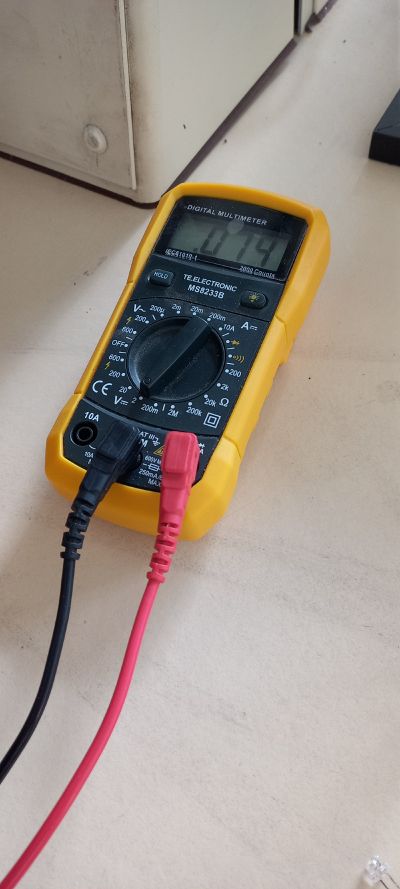GMU:Sustainable Aesthetics/Cindy Augustin/Microbial fuel cell: Difference between revisions
From Medien Wiki
m (Max moved page Microbial fuel cell to GMU:Sustainable Aesthetics/Cindy Augustin/Microbial fuel cell: use subpages) |
Tag: 2017 source edit |
||
| Line 1: | Line 1: | ||
==Microbial fuel cell== | ==Microbial fuel cell== | ||
===materials:=== | |||
* Petri dish | |||
* Hot glue/ glue gun | |||
* 2 cables with 2 contacts each | |||
* Crocodile cable | |||
* mud | |||
* water | |||
* Voltmeter | |||
* Agar-Agar Powder | |||
===Experiment=== | |||
# Mix agar-agar powder with water which will later be placed in the middle of the Petri dish. --> allow to set | |||
# Glue both cables with contacts on opposite sides of the Petri dish with a glue gun. (pic1) --> Make sure that the glue does not come into contact with the end of the cable. | |||
# Put the agar-agar, which has become solid in the meantime, in the middle of the petri dish, so that it will later become the connecting piece between the two sides of the petri dish. (pic2) | |||
# Fix the agar-agar in the middle with the help of the glue. The glue should be applied thickly over the entire middle of the dish so that a kind of wall is created between the two cables.(pic3) --> Important: '''do not leave any gaps''' when glueing, otherwise the experiment will not work properly. | |||
# Then pour water onto one side of the bowl and make sure that the contact of the cable is covered. --> Now do the same on the opposite side with the previously collected mud. --> Again: Make sure that the water and the mud do not mix. (pic4) | |||
# Adapters can now be attached to the cables, which are connected to a voltmeter.(Pic5) | |||
# At the end of the experiment, a voltage should be read off.(pic6) | |||
# The aim of the experiment is to generate more and more voltage. --> This can be done by covering the dish after the project and letting it stand. After some time, more and more bacteria form in the sludge, which means that if you repeat the experiment after a week, a higher voltage will be measurable. | |||
--> allow to set | |||
--> Make sure that the glue does not come into contact with the end of the cable. | |||
The glue should be applied thickly over the entire middle of the dish so that a kind of wall is created between the two cables.(pic3) | |||
--> Important: '''do not leave any gaps''' when glueing, otherwise the experiment will not work properly. | |||
--> Now do the same on the opposite side with the previously collected mud. | |||
--> Again: Make sure that the water and the mud do not mix. (pic4) | |||
--> This can be done by covering the dish after the project and letting it stand. After some time, more and more bacteria form in the sludge, which means that if you repeat the experiment after a week, a higher voltage will be measurable. | |||
---- | ---- | ||
Revision as of 15:51, 20 February 2024
Microbial fuel cell
materials:
- Petri dish
- Hot glue/ glue gun
- 2 cables with 2 contacts each
- Crocodile cable
- mud
- water
- Voltmeter
- Agar-Agar Powder
Experiment
- Mix agar-agar powder with water which will later be placed in the middle of the Petri dish. --> allow to set
- Glue both cables with contacts on opposite sides of the Petri dish with a glue gun. (pic1) --> Make sure that the glue does not come into contact with the end of the cable.
- Put the agar-agar, which has become solid in the meantime, in the middle of the petri dish, so that it will later become the connecting piece between the two sides of the petri dish. (pic2)
- Fix the agar-agar in the middle with the help of the glue. The glue should be applied thickly over the entire middle of the dish so that a kind of wall is created between the two cables.(pic3) --> Important: do not leave any gaps when glueing, otherwise the experiment will not work properly.
- Then pour water onto one side of the bowl and make sure that the contact of the cable is covered. --> Now do the same on the opposite side with the previously collected mud. --> Again: Make sure that the water and the mud do not mix. (pic4)
- Adapters can now be attached to the cables, which are connected to a voltmeter.(Pic5)
- At the end of the experiment, a voltage should be read off.(pic6)
- The aim of the experiment is to generate more and more voltage. --> This can be done by covering the dish after the project and letting it stand. After some time, more and more bacteria form in the sludge, which means that if you repeat the experiment after a week, a higher voltage will be measurable.
